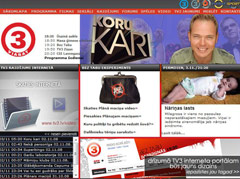Latvia, Legislation, Markets and Companies, Telecomunications
International Internet Magazine. Baltic States news & analytics
Monday, 29.12.2025, 18:18
Language requirements for broadcasters altered in Electronic Mass Media Law in Latvia
 Print version
Print version |
|---|
Zatlers said, returning the bill to the Saeima, that the requirement, which said at least 40% of European audio-visual works broadcast from 7 p.m. to 11 p.m. must be in Latvian language, must apply to national as well as regional mass media, stipulate that the said works also include news broadcasts in the state language, and extend said period by one hour: from 6 p.m. to 11 p.m.
Therefore, the requirements would be the same for all the largest and most influential mass media in Latvia, they would also encourage the development of news broadcasts in the state language, and therefore strengthen the positions of the state language, in accordance with the Constitution and the State Language Law, which say that Latvian nationals have the right to information and cultural space in the state language, writes LETA.
Zatlers also pointed out in his remarks that the environment of electronic mass media forms an important element of linguistic environment and is an important factor in society integration. Thus, the law is in interest of not only the state and nation of Latvia but also ethnic minorities.
The Saeima today altered the law so that at least 51% of broadcasting time be Europe-produced audiovisual works, except for news, sports broadcasts, games, advertisements, TV shops and suchlike.
Furthermore, at least 40% of these works must be in the state language – for both national and regional electronic mass media, the Saeima decided.
Finally, the law now also provides that at least 65% of all broadcasts, except commercials and TV shops, must be in the state language, and such broadcasts must make up at least 65% of the broadcasting time.
The new law also sets restrictions on advertising amounts and periods in the electronic mass media.








 «The Baltic Course» Is Sold and Stays in Business!
«The Baltic Course» Is Sold and Stays in Business!

